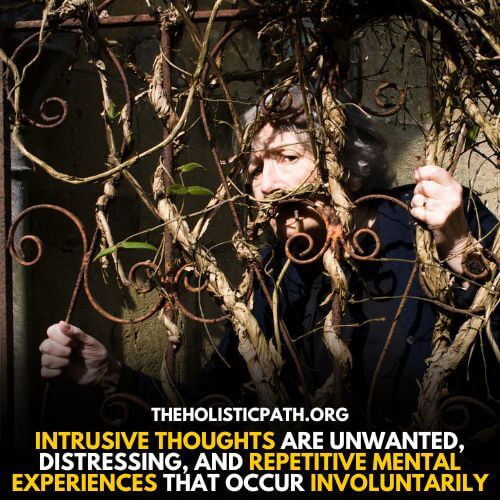Obsessive-Compulsive Disorder (OCD) and rumination maintain an intricate relationship, weaving a complex web that entraps individuals in a cycle of persistent, intrusive thoughts. This entanglement, often overwhelming and mentally taxing, is a hallmark of OCD rumination.
Rumination is a state where the mind becomes fixated, unable to disengage from recurring, distressing thoughts.
Breaking free from this cycle is not only possible but achievable. Understanding the mechanisms of rumination within OCD is crucial. Discovering how to redirect these thoughts toward healthier patterns is key to cultivating a more content and productive mindset.
This article delves into the nuances of OCD rumination, offering insights and strategies to help individuals regain control and navigate toward a more positive mental space.
Ruminating Thoughts: What Are They?
Ruminating thoughts are like a broken record in your mind, replaying the same worries, regrets, or fears over and over again. It’s when you can’t stop thinking about something that bothers you—a mistake you made, something that scares you, or something that makes you sad. This could be about the past, like an embarrassing moment, or about the future, like worrying about what might go wrong.
These thoughts often make you feel stuck as if you’re spinning in circles without finding a way out.
They can be a big part of different problems like feeling too anxious, sad, or overwhelmed. For instance, in conditions like anxiety, depression, or OCD, these repetitive thoughts can make things harder.
It’s like trying to solve a problem by thinking about it again and again, but instead of feeling better, you end up feeling more upset or stressed. It’s a bit like trying to untangle a knot but just making it tighter. This constant thinking can make it tough to enjoy things and can make you feel tired or low.
What Does OCD Rumination Feel Like? 9 Signs & Symptoms
OCD rumination is an obsessive and distressing experience. It typically involves fixating on specific thoughts, images, or worries that become persistent and intrusive, leading to significant distress or anxiety.
Here’s a breakdown of the signs and symptoms:
| Signs and Symptoms of OCD Rumination | What It Feels Like |
|---|---|
| 1. Intrusive Thoughts | Recurring unwanted thoughts, which might be disturbing, aggressive, or taboo. These thoughts are difficult to control and cause distress. |
| 2. Perseveration | Continuously thinking about the same subject, unable to break free from the cycle of thought. |
| 3. Excessive Doubt | Constantly questioning actions or decisions, even if they seem insignificant to others. |
| 4. Mental Review | Replaying scenarios, conversations, or events in the mind to ensure that everything was done “correctly” or to prevent harm. |
| 5. Overanalyzing | Fixating on minor details, trying to find reassurance or certainty. This can apply to fears, worries, or a need for symmetry and order. |
| 6. Fear of Making Mistakes | Extreme fear of making a mistake, leading to repetitive checking or seeking reassurance to prevent errors. |
| 7. Emotional Distress | Intense anxiety, guilt, or discomfort due to the inability to control or dismiss intrusive thoughts. |
| 8. Impact on Daily Life | Significant interference with daily activities, causing distress, difficulty concentrating, and affecting work, relationships, or personal life. |
| 9. Physical Symptoms | Stress-related physical symptoms like tension, fatigue, headaches, or stomach issues due to ongoing mental distress. |
Is There a Difference Between Rumination and Intrusive Thoughts?
Rumination and intrusive thoughts are related but distinct concepts, often associated with various mental health conditions, including Obsessive-Compulsive Disorder (OCD) and anxiety disorders.
Intrusive Thoughts:
Intrusive thoughts are unwanted, distressing, and repetitive mental experiences that occur involuntarily. These thoughts can take various forms, often including disturbing, irrational, or distressing content.
For example, someone with relationship OCD may experience intrusive thoughts about their partner cheating on them, while a person with harm OCD may have intrusive thoughts about causing harm to others.
Intrusive thoughts can be highly disturbing and anxiety-inducing and are usually difficult to control.
Rumination:
Rumination, on the other hand, refers to a pattern of repetitive and prolonged thinking about one’s thoughts, feelings, and problems. Unlike intrusive thoughts, which are often intrusive and sudden, rumination is a voluntary cognitive process.
It involves continuously replaying and analyzing thoughts, often revolving around a particular theme, concern, or problem. Rumination can also be distressing and can exacerbate anxiety and depression.

The Link Between Intrusive Thoughts, Rumination, and OCD:
Intrusive thoughts, rumination, and Obsessive-Compulsive Disorder (OCD) are interconnected in a complex way. To understand their relationship, let’s break down each of these components and their connections:
| Intrusive Thoughts | Rumination | OCD | |
|---|---|---|---|
| Definition | Unwanted, distressing thoughts | Repetitive thinking about the same thoughts | Mental health condition with obsessions and compulsions |
| Commonality | Intrusive thoughts often trigger rumination | Rumination often revolves around intrusive thoughts | Obsessions in OCD are typically intrusive thoughts |
| Distress | Intrusive thoughts cause distress | Rumination perpetuates distress | Obsessions with OCD are distressing |
| Compulsions | Often leads to compulsive behaviors in OCD | Obsessive thoughts may drive compulsions | Compulsions are a key feature of OCD |
| Cognitive Aspect | Primarily related to the content of thoughts | Focuses on the process of thinking | Characterized by both obsessions and compulsions |
| Interventions | Cognitive-Behavioral Therapy (CBT), Exposure and Response Prevention (ERP) | CBT, mindfulness techniques | CBT, exposure therapy, medication (e.g., SSRIs) |
OCD is a mental health condition characterized by the presence of obsessions (intrusive thoughts) and compulsions (repetitive behaviors or mental acts). Intrusive thoughts are a hallmark feature of OCD, and they lead to the development of obsessions.
Obsessions are the unwanted and distressing thoughts that trigger anxiety or distress in individuals with OCD. To alleviate this distress, individuals with OCD engage in compulsions, which are repetitive behaviors or mental acts aimed at reducing the anxiety associated with their obsessions.
For instance, someone with contamination OCD may experience intrusive thoughts about germs, which leads to obsessions about being contaminated. In response, they may compulsively wash their hands to reduce their anxiety. This compulsive behavior temporarily alleviates the distress but reinforces the cycle, as it doesn’t address the underlying cause.
Rumination can also be associated with OCD, particularly in cases known as “Pure-O” or “Purely Obsessional” OCD.
In Pure-O, individuals experience intrusive, distressing thoughts or mental images without visible compulsions. Instead, they ruminate excessively on these thoughts, trying to analyze, interpret, or neutralize them mentally. This form of OCD is marked by a continuous cognitive loop of rumination that exacerbates distress and anxiety.
How Do I Stop Ruminating Ocd? 5 Best Treatments
OCD is a potentially debilitating condition that can cause sufferers to engage in repetitive and intrusive thoughts: rumination. While medication and therapy can be effective treatments, there are also lifestyle changes that can help to ease pure OCD rumination. Here are 5 of the most effective:
1. Mindfulness Techniques
Mindfulness practices involve cultivating an awareness of the present moment without judgment. This approach can empower individuals to observe their intrusive thoughts without becoming consumed by them.
Through mindfulness techniques like meditation, grounding exercises, or body scanning, individuals can develop skills. These skills help them acknowledge their obsessive thoughts without letting those thoughts dictate their actions or emotions.
If you are interested you can start with:
- Grounding exercises: Techniques that focus on sensory experiences, like feeling different textures or observing specific objects, to anchor attention to the present moment.
- Body scanning: A method involving a mental scan through the body, paying attention to physical sensations, which can help shift focus away from obsessive thoughts.
2. Cognitive Behavioral Therapy (CBT)
CBT is a leading therapeutic approach for managing OCD, including rumination. It involves recognizing, challenging, and transforming distorted thought patterns and behaviors.
Within CBT, exposure and response prevention (ERP) is a pivotal technique. ERP encourages individuals to confront anxiety-triggering situations or thoughts gradually, without engaging in the compulsive behaviors that typically follow.
Through CBT and ERP, individuals can learn to reframe their thoughts and reduce the intensity of their obsessive rumination.

3. Exercise and Lifestyle Modifications
Regular physical exercise and positive lifestyle changes play a pivotal role in managing OCD symptoms, particularly rumination. They can significantly impact mental health by addressing stress, anxiety, and depression, which often intertwine with OCD symptoms.
A balanced lifestyle incorporating regular exercise, a healthy diet, ample sleep, and stress management techniques contributes to overall mental well-being, potentially reducing the severity of OCD rumination.
- Aerobic exercises: Engaging in activities such as running, swimming, or cycling positively influences mental health and aids in managing OCD symptoms.
- Mind-body practices like Yoga and Tai Chi: These practices involve both physical activity and emphasize mindfulness and relaxation, potentially assisting in managing obsessive thoughts and alleviating the impact of OCD symptoms.
4. Engaging in Creative Pursuits
Participating in creative activities such as art, music, writing, or any form of self-expression can serve as a valuable distraction from obsessive thoughts. Creative outlets offer individuals a means of self-expression and can aid in reducing stress and anxiety linked to OCD rumination.
These activities provide a platform for channeling emotions and thoughts, potentially offering relief from the preoccupying nature of rumination.
Some of the creative pursuits that can help in this regard include:
- Journaling: Writing down thoughts and feelings can help externalize them, reducing their impact on the mind.
- Visual arts: Engaging in drawing, painting, or sculpting may provide a meditative and expressive outlet for managing intrusive thoughts.
5. Deep Breathing and Relaxation Techniques
Practicing deep breathing exercises is beneficial in managing anxiety and reducing the intensity of intrusive thoughts associated with OCD rumination. Deep breathing activates the body’s relaxation response, calming the mind and body.
Focusing on deep, slow breaths can help reduce the physiological symptoms of anxiety, potentially breaking the cycle of obsessive thoughts and compulsive behaviors.
- Progressive muscle relaxation: A method involving the systematic tensing and relaxing of muscle groups, aiding in overall relaxation.
- Guided imagery: Using visualization techniques to create calming mental images can promote relaxation and reduce anxiety.
Combining these strategies, along with professional guidance and support, can significantly assist individuals in managing OCD rumination and regaining control over their thoughts and behaviors. It’s crucial to customize these approaches to fit an individual’s specific needs and preferences. Consulting a mental health professional can provide tailored guidance and support in applying these techniques effectively.
OCD Rumination in Adolescents: 6 Signs to Look For
Understanding and recognizing the signs of OCD rumination in adolescents is crucial for parents to provide timely support and intervention. Recognizing these signs enables families to take proactive steps in assisting their teenagers with OCD.
Here are key indicators to help parents identify the presence of OCD rumination in their adolescents:
Signs to Watch for:
- Excessive Worrying: Adolescents experiencing OCD rumination often exhibit frequent and distressing worries. These concerns may be irrational or unrealistic, dominating their thoughts with an inability to control them.
- Time-Consuming Rituals: Teens might engage in time-consuming mental rituals or compulsions aimed at neutralizing their distress. These rituals can involve counting, checking, or seeking reassurance.
- Academic or Social Interference: OCD rumination may significantly impact their daily life. This interference could lead to decreased academic performance or withdrawal from social interactions and activities they once enjoyed.
- Avoidance Behaviors: Teens might actively avoid situations or places that trigger their obsessions, leading to a reduction in their everyday activities.
- Mood Changes: Adolescents experiencing rumination might exhibit persistent sadness, irritability, or extreme frustration due to the distress caused by their obsessive thoughts.
- Physical Symptoms: The stress from rumination can manifest physically, leading to symptoms such as fatigue, headaches, or digestive issues.
How to Help the Teen With Ocd Rumination
Once parents suspect their teenagers are exhibiting signs of OCD rumination, it is essential to approach the situation with empathy and proactive support:
- Initiate a conversation with openness and express concern for their well-being.
- Avoid judgment and actively listen to their experiences.
- Encourage seeking professional help from mental health specialists experienced in treating OCD.
By being attentive to these signs and openly communicating, parents can significantly support their teenagers in coping with OCD rumination. Timely intervention and professional guidance play a crucial role in helping adolescents manage their condition and improve their overall well-being.
Final Word
If you’re struggling with pure OCD rumination, know that you’re not alone. This is a common form of OCD that can be extremely tricky to overcome. However, with the right treatment and support, recovery is possible. If you’re ready to start your journey, reach out for help today. Remember, you are strong and capable – you can do this!
References
Lan, J., & Sher, T. G. (2018). Cognitive-Behavioral Family Therapy. Encyclopedia of Couple and Family Therapy, 1–9. https://doi.org/10.1007/978-3-319-15877-8_40-1
Cartwright, R. (2019, February 14). Pure OCD: a rude awakening. The Guardian. https://www.theguardian.com/society/2013/aug/31/pure-ocd-the-naked-truth

